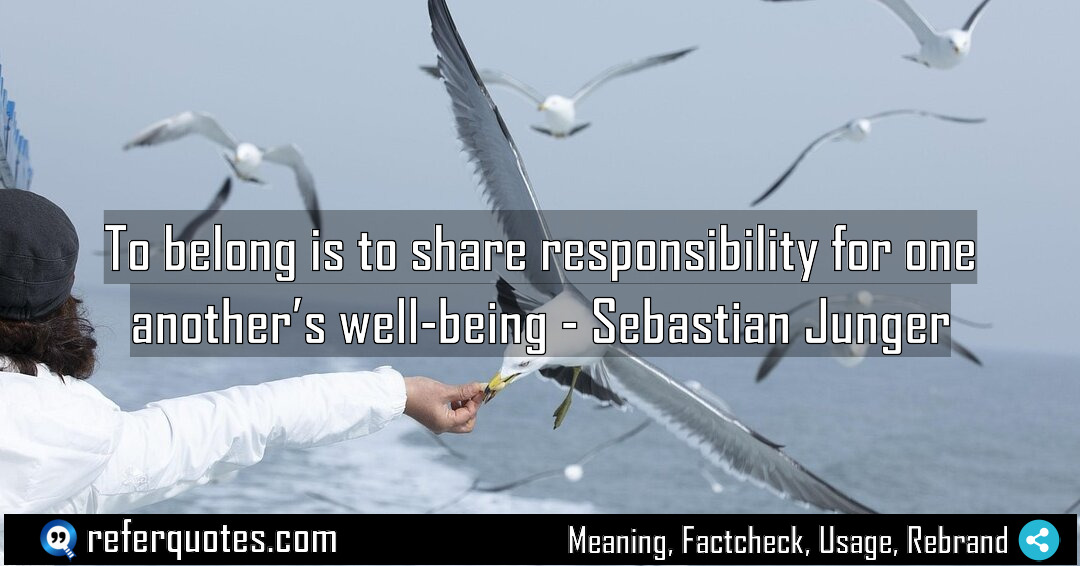
You know, that idea that “To belong is to share responsibility” really hits different when you see it in action. It’s not just about feeling included; it’s about the active, sometimes difficult work of looking out for each other. That’s the glue.
Share Image Quote:
Table of Contents
Meaning
The core message is that true belonging isn’t a passive state of being included; it’s an active commitment to the welfare of the people in your group.
Explanation
Let me break it down. We often think of belonging as a feeling, right? A warm, fuzzy sensation. But Junger flips that. He’s saying the feeling is the *result*, not the cause. The cause is the responsibility. It’s the understanding that your well-being is tied to mine, and vice versa. It’s the unspoken contract that makes a collection of individuals into a real tribe. Without that mutual investment, you just have a crowd.
Quote Summary
Reading Level67
Aesthetic Score82
Origin & Factcheck
This comes straight from Sebastian Junger’s 2016 book, Tribe: On Homecoming and Belonging. It’s a key thesis of his work, exploring why modern society feels so isolating compared to tighter-knit communities. You won’t find it misattributed to anyone else—this is pure Junger, born from his years reporting from conflict zones and studying tribal societies.
Attribution Summary
Author Bio
Sebastian Junger is born in Belmont, United States on 1962. He studied cultural anthropology at Wesleyan University and built his career in journalism. He is the one of the leading contributor and editor at Vanity Fair. Along with Tim Hetherington, he codirected Restrepo(2010 American documentary), which went on to win Sundance’s Grand Jury Prize and an Academy Award nomination. The Sebastian Junger book list includes The Perfect Storm, Tribe, A Death in Belmont, Freedom, War, and In My Time of Dying, each marked by distinct writing style
| Official Website
Where is this quotation located?
| Quotation | To belong is to share responsibility for one another’s well-being |
| Book Details | Publication Year: 2016; ISBN: 978-1-4555-6638-6; Last edition: 2017; Number of pages: 192. |
| Where is it? | Chapter 4: Calling Home, Approximate page 120 from 2017 edition |
Context
Junger builds this idea by contrasting modern, individualistic life with the communal structures of ancient tribes and even platoons in war. He observed that in these high-stakes environments, where survival depends on it, this shared responsibility isn’t just nice—it’s essential. And paradoxically, it often leads to greater mental health and fulfillment than our “safer,” more independent lives.
Usage Examples
This isn’t just theoretical. You see it everywhere when you start looking.
- In a Company: A team that truly belongs isn’t the one with the best perks. It’s the one where people cover for each other before a big deadline, where they actively help a struggling colleague catch up. That’s shared responsibility.
- In a Neighborhood: It’s not just about living next to each other. It’s the neighbor who shovels your walk without being asked, or who keeps an eye on your package. That small act says “you’re part of this, I’ve got you.”
- In a Family: Beyond just being related, it’s the adult siblings checking in on their aging parents, sharing the load. That’s the operational definition of family belonging.
Honestly, this quote is a gut-check for team leaders, community organizers, and anyone feeling disconnected.
To whom it appeals?
Share This Quote Image & Motivate
Motivation Score83
Popularity Score85
Shareability Score84
FAQ
Question: Does this mean I’m responsible for everyone in my group?
Answer: It’s a shared, mutual responsibility. It’s not about one person carrying the whole load, but about a culture where everyone understands that their actions impact the group’s well-being. It’s a two-way street.
Question: What if the responsibility feels one-sided?
Answer: Then you don’t have a tribe; you have exploitation. Junger’s concept is fundamentally about reciprocity. If you’re giving but never receiving, that’s a sign the “belonging” is broken.
Question: How is this different from codependency?
Answer: Great question. Codependency is about an unhealthy enmeshment and a loss of self. This is about interdependence—healthy individuals choosing to support each other while maintaining their own autonomy. It’s the difference between “I need you to be okay for me to be okay” and “We are both better off when we look out for each other.”
Similar Quotes
To belong is to be part of something… that’s the core of Sebastian Junger’s powerful idea. It’s about finding a group or cause so meaningful you’d willingly give something up…
To belong is to understand that your story is bound with others. It’s a powerful idea that flips the script on modern individualism. True belonging isn’t about fitting in, it’s…
Belonging gives meaning to suffering by transforming it from a solitary burden into a shared purpose. It’s the difference between just surviving and surviving for something greater than yourself. Table…
Belonging is not about similarity… it’s a game-changing insight about what truly connects us. It’s not who you are, but what you do together that forges the deepest bonds. This…
True belonging is earned through shared struggle, not shared comfort. It’s a powerful idea that flips our modern understanding of community on its head, suggesting that the deepest bonds aren’t…
